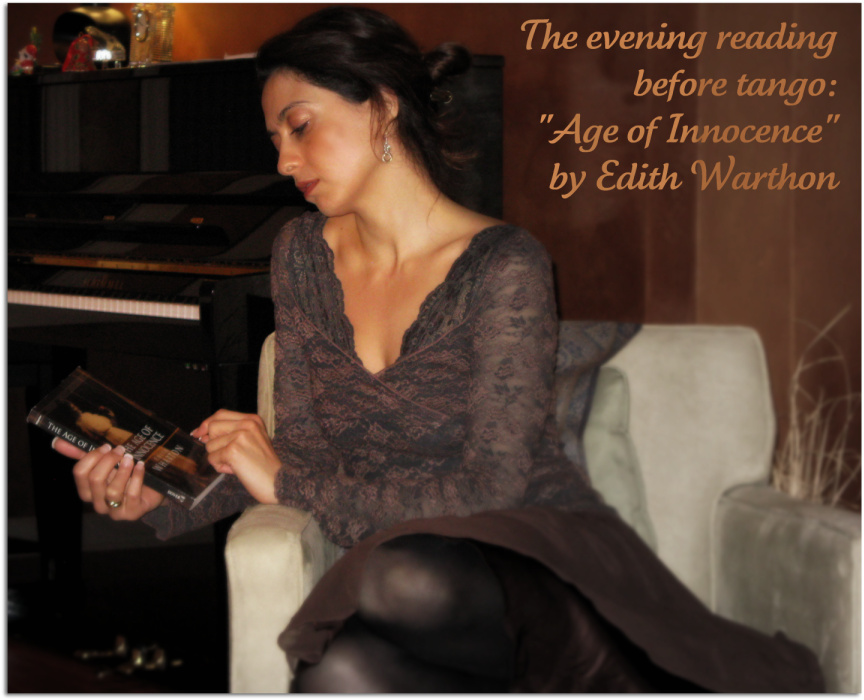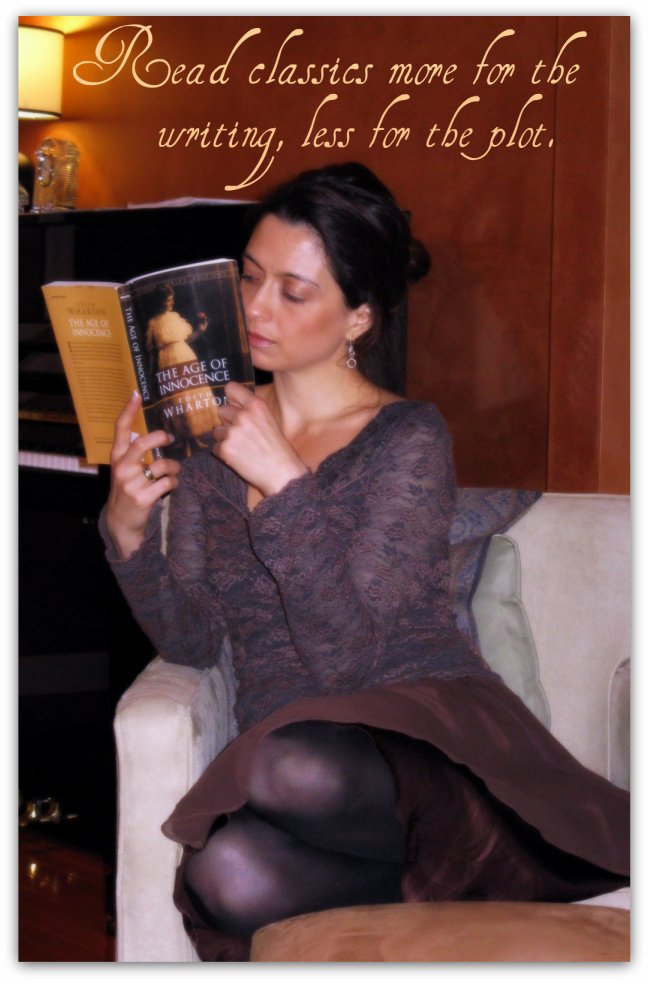Be it naïveté or lack of insight, I have never understood all the fuss about New York and its self-proclaimed greatness. Try as I might, I cannot recollect a single memory of a warm encounter, a nice experience or a kind human interaction during my visits. Sadly, I do have a few sour such memories, but you learn to write those off as exceptions, especially if the good ones balance things out. After all, the amalgamation of dozens of religions and cultures is bound to produce its challenges anywhere on earth, particularly in big cities. Even so, New York’s inadequate impression on me remains unchanged as yet.

Reading is the best pastime for an active mind! If you like to see the other book reviews, check the index of In Print.
So it is with great reluctance that I started Edith Wharton’s classic short novel on high society life in New York city at the close of 19th century (1870s). Wharton’s Pulitzer-prize winning “Age of Innocence” depicts all the hypocrisy and convention, duty and criticism, propriety and snobbery of the New York elite as it tells the story of protagonist Newland Archer who is the product of this very society and his agonies over the boundaries of its imposed limits. The story is really just about Newland and the two women in his life, one who is the safe predictable and decent choice by all society’s then standards, and one who is not. Indeed, you would not be mistaken to think this a dull plot, told in no less than a million other works of fiction or real life. But alas, few others are written in the prose and authenticity of Edith Wharton’s writing style, reason enough to read “Age of Innocence”.
I think I liked Wharton less than Henry James, far less than Jane Austen, and on no visible scale with Emily Brontë«’, but I still consider her mastery and command of the rich English language a talent bestowed on few. Her plot of characters was more complex than what I would have liked in such a short novel, and the intricacies of the detailed interactions among the distant characters interested me minimally in the context of the plot, but tremendously in the context of New York elite mindset and ways. Was New York ever so confined to such rigid way of thinking and existing, and European way of life considered so disgraceful and degrading in comparison?
Described as it was in these circumstances, it is no wonder that Newland Archer is desperately tempted to break free from the reigns of a society that is strangling his sense of freedom, his desire to live passionately, and his dreams of traveling far. He seems to be questioning society’s substandard treatment of its female population even before meeting Countess Ellen Olenska, who conveniently becomes the prime example in his mental brooding on the subject. Meanwhile, he grows anxious and desperate about his upcoming nuptials to May Welland, the ideal match for a life guaranteed to mold into the elite society. And toward this very elite society, he fosters a growing indifference and quiet disgust to the hypocritical and judgmental many whose opinions count inexplicably far too much, and whose own conducts are exempt from the same rules. It is in this quiet misery that Newland Archer exists, with a growing agony of being torn between his sense of duty and security and his burning desire to be with Ellen.
It is difficult to understand Newland Archer. He seems more of an observer of his own life than one in control of it. He seems to be deeply meditating on his choices and hardly acting on them. He studies May Welland, his wife, as though studying a dull piece of art, in great lengths, and expresses surprise at every new discovery. He then compares her to Ellen and finds everything that is not May attractive and desirable. His rush into an engagement and subsequent marriage to May seem at odds with his intense desire to pursue this unrequited love for her cousin, Ellen.

Wharton leaves a lot to the imagination. I still do not understand why Newland does not seriously pursue Ellen Olenska. Is it society’s disapproval? Not a strong enough reason for a man like Newland Archer for which to give up his heartthrob. Maybe the answer is in the poetic title: Age of Innocence. Is the Innocence then a reference to the youth that knows no better, and wants that which it cannot have? Is it the Innocence of deeds and duties that is unquestionably carried out under society’s pressures and expectations? Or is it really an element in Newland’s own personality, whence all his actions are born? Newland Archer is far too analytical, perceptive and observational of the world around him to be attributed any such Innocence. He is well in touch with the dynamics of society and takes extremely calculated measures in all his actions. One of his many descriptions of May: “The blood that ran so close to her fair skin might have been a preserving fluid rather than a savaging element…” is entirely accurate and in great harmony with her actions. He knows that everything about her conduct is as predictable as the rise and setting of the sun, and she fulfills the expectations of an ideal wife in her position. He sees that she will never surprise him with an act of passion, cruelty, sentiment or excitement and that she will never deviate from the absolute norm according to the elite society standards. He also knows that she will never fulfill him the way Ellen Olenska can. These are hardly observations born of Innocence.
These observations, which ought to drive him to action, simply terrify him momentarily yet he always returns home to May. He wonders off to Ellen on a multitude of opportunities, letting any circumstance invite the occasion for conversation or a chance only to see her and to lay eyes on her sensual beauty. Oh her perfection in his eyes: “All the beauty that had forsaken her face seemed to have taken refuge in the long pale fingers and …..he said to himself: “If it were only to see her hand again I should have to follow her -“ ” If only she remained in America and did not return to her scoundrel of a husband in Europe, then he could see her, and be with her. But what of May and his married life, he hardly explores that dilemma.
Newland Archer is an indecisive man, whom society manages to bend and mold into the “perfect” husband and father. Society, elite or otherwise, does not care that his heart is filled with regrets 30 years into the future, and his own sense of purpose in life left unaccomplished. But I argue that Newland himself does not care either, for why else does he not pursue Ellen more obstinately? Why does he let the opportunities slip, and his youth and dreams slip even faster? Why would anyone allow that in the blatant presence of such possibility for true happiness?
It is the sign of an accomplished author that makes us think, question, wonder, and urges us to re-read some sections of the book in search of answers, understanding or just for the quiet joy of beautiful prose. A highly accomplished author who leaves me flipping through the pages for her eloquence of the inarticulate in the human emotion and circumstance:
On the double standards of society for men and women in reference to love affairs: “Mrs Archer believed that when “such things happened” it was undoubtedly foolish of the man but somehow always criminal of the woman.”
On observing Ellen Olenska’s ways, so unique and carefree: “Archer looked at her perplexedly, wondering if it were lightness or dissimulation that enabled her to touch so easily on the past at the very moment when she was risking her reputation in order to break with it.“
On his inner conflict with marriage and convention: “It was less trouble to conform with the tradition and treat May exactly as all his friends treated their wives than to try to put into practice the theories with which his untrammeled bachelorhood had dallied…..there was no use in trying to emancipate a wife who had not the dimmest notion that she was not free…”
On his burning desire to be and to love Madame Olenska: “The longing was with him day and night, an incessant undefinable craving, like the sudden whim of a sick man for food or drink once tasted and long since forgotten. He could not see beyond the craving, or picture what it might lead to, …He simply felt that if he could carry away the vision of the spot of earth she walked on, and the way the sky and sea enclosed it, the rest of the world might seem less empty.”
 I am Farnoosh, the founder of Prolific Living. So glad you are here. My mission is to empower you to unblock your creative genius to live your dream life.
I am Farnoosh, the founder of Prolific Living. So glad you are here. My mission is to empower you to unblock your creative genius to live your dream life.